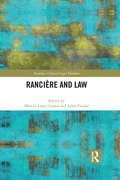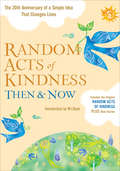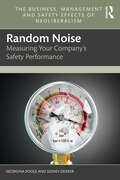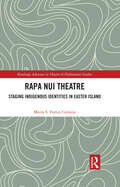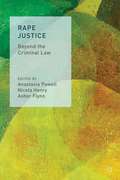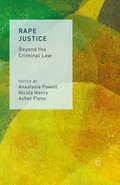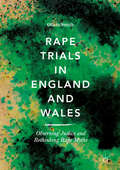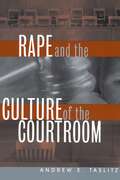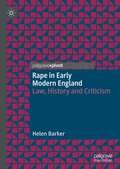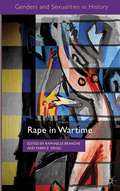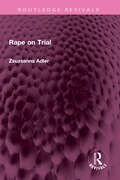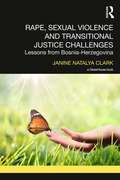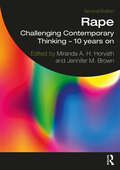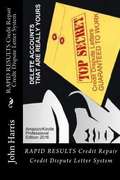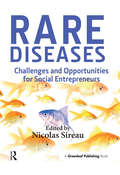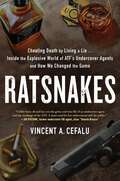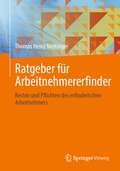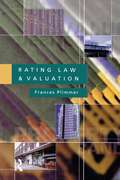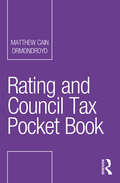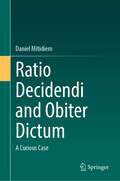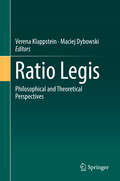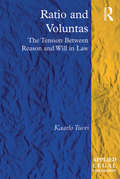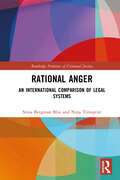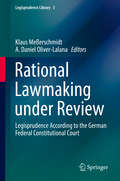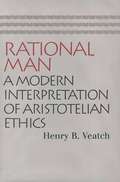- Table View
- List View
Ranciere and Law (Nomikoi: Critical Legal Thinkers)
by Monica Lopez Lerma Julen EtxabeThis book is the first to approach Jacques Rancière’s work from a legal perspective. A former student of Louis Althusser, Rancière is one of the most important contemporary French philosophers of recent decades: offering an original and path-breaking way to think politics, democracy and aesthetics. Rancière’s work has received wide and increasing critical attention, but no study exists so far that reflects on the wider implications of Rancière for law and for socio-legal studies. Although Rancière does not pay much specific attention to law—and there is a strong temptation to identify law with what he terms the "police order"—much of Rancière’s historical work highlights the creative potential of law and legal language, with important legal implications and ramifications. So, rather than excavate the Rancièrean corpus for isolated statements about the law, this volume reverses such a method and asks: what would a Rancière-inspired legal theory look like? Bringing together specialists and scholars in different areas of law, critical theory and philosophy, this rethinking of law and socio-legal studies through Rancière provides an original and important engagement with a range of contemporary legal topics, including constituent power and democracy, legal subjectivity, human rights, practices of adjudication, refugees, the nomos of modernity, and the sensory configurations of law. It will, then, be of considerable interest to those working in these areas.
Random Acts of Kindness Then & Now: The 20th Anniversary Of A Simple Idea That Changes Lives
by M. J. Ryan Addie JohnsonThe original bestseller that inspired a movement, plus new stories and wisdom from people whose lives it has changed. More than twenty-five years ago, Conari Press published Random Acts of Kindness, and launched a simple movement—of people being kind to one another in their daily lives. Now the editors of Conari Press have compiled Random Acts of Kindness Then and Now, which includes the original book along with new material sourced from Facebook, Twitter, and various other social networks. It combines the best of twenty-first-century crowd-sourced wisdom with the best of twentieth century social activism. The inspiration for the kindness movement, Random Acts of Kindness is an antidote for a weary world. Its true stories, thoughtful quotations, and suggestions for generosity inspire readers to live more compassionately in this beautiful new edition. The original Random Acts of Kindness was named a Best Bet for Educators in 2000 by USA Today. This expanded edition can help a whole new generation of readers restore their faith in humanity.
Random Noise: Measuring Your Company's Safety Performance (The Business, Management and Safety Effects of Neoliberalism)
by Sidney Dekker Georgina PooleIn the realm of safety management, this book embarks on a profound exploration of how the political economy was reshaped in the last two decades. Much like privatization, deregulation, and financialization altered the economic landscape, this narrative unveils how safety management has been affected by the intertwined dynamics of asset underinvestment, privatization, self-regulation, workplace flexibilization, and market-driven policies.This book, the second installment of a thought-provoking trilogy on the consequences of neoliberalism, mirrors the political economy's promotion of the private sector's role in the economy. Just as neoliberalism amplified and accelerated the mechanisms of human-made disasters in complex systems, this narrative lays bare the heightened potential for safety misfortunes when governed by market-driven principles.As the story unfolds, the book delves into the concept of 'synoptic legibility' in safety management, akin to how the political economy distilled its essence into privatization and deregulation. The authors scrutinize the consequences of translating safety measures into rigid targets, unveiling how this shift can distort the integrity of safety metrics and inadvertently harm individuals. Drawing parallels with historical blunders such as England's window tax, the book contemplates the precarious nature of equating simplified metrics with safety achievements. Much like the political economy's 'acceptable risk' renegotiations, it examines how the pursuit of safety through metrics and surveillance can lead to 'manufactured insecurity,' eroding trust, autonomy, and professionalism.In Random Noise, Poole and Dekker extend this reach once again, writing for all managers, board members, organization leaders, consultants, practitioners, researchers, lecturers, students, and investigators curious to understand the genuine nature of organizational and safety performance.
Rapa Nui Theatre: Staging Indigenous Identities in Easter Island (Routledge Advances in Theatre & Performance Studies #1)
by Moira Fortin CornejoThis book examines the relationships between theatrical representations and socio-political aspects of Rapa Nui culture from pre-colonial times to the present. This is the first book written about the production of Rapa Nui theatre, which is understood as a unique and culturally distinct performance tradition. Using a multilingual approach, this book journeys through Oceania, reclaiming a sense of connection and reflecting on synergies between performances of Oceanic cultures beyond imagined national boundaries. The author argues for a holistic and inclusive understanding of Rapa Nui theatre as encompassing and being inspired by diverse aspects of Rapa Nui performance cultures, festivals, and art forms. This book will be of great interest to students and scholars of Indigenous studies, Pacific Island studies, performance, anthropology, theatre education and Rapa Nui community, especially schoolchildren from the island who are learning about their own heritage.
Rape Justice: Beyond the Criminal Law
by Asher Flynn Nicola Henry Anastasia PowellThis book explores the burgeoning interest in alternative and innovative justice responses to sexual violence both within and outside the legal system. It explores the limits of criminal law for achieving 'rape justice' and highlights possibilities for expanding how we think about justice in the aftermath of sexual violence.
Rape Justice: Beyond the Criminal Law (Interventions Ser.)
by Asher Flynn Nicola Henry Anastasia PowellThis book explores the burgeoning interest in alternative and innovative justice responses to sexual violence both within and outside the legal system. It explores the limits of criminal law for achieving 'rape justice' and highlights possibilities for expanding how we think about justice in the aftermath of sexual violence.
Rape Trials in England and Wales: Observing Justice And Rethinking Rape Myths
by Olivia SmithIn light of ongoing concerns about the treatment of survivors, Rape Trials in England and Wales critically examines court responses to rape and sexual assault. Using new data from an in-depth observational study of rape trials, this book asks why attempts to improve survivor experiences at court have not been fully effective. In doing so, Smith identifies deep-rooted barriers to survivor justice and, crucially, introduces potential avenues for more effective reform. This book provides a comprehensive examination of the practicalities of court, use of rape myths and sexual history evidence, underlying principles of adversarial justice and the impact of inequalities embedded within English and Welsh legal culture. This engaging and highly significant study is essential reading for anyone seeking to understand the criminal courts and their responses to rape, including practitioners and students of criminology, sociology, and law.
Rape and the Culture of the Courtroom (Critical America #6)
by Andrew E. TaslitzRape law reform has been a stunning failure. Defense lawyers persist in emphasizing victims' characters over defendants' behavior. Reform's goals of increasing rape report and conviction rates have generally not been achieved. In Rape and the Culture of the Courtroom, Andrew Taslitz locates the cause of rape reform failure in the language lawyers use, and the cultural stories upon which they draw to dominate rape victims in the courtroom. Cultural stories about rape, Taslitz argues, such as the provocatively dressed woman "asking for it," are at the root of many unconscious prejudices that determine jury views. He connects these stories with real-life examples, such as the Mike Tyson and Glen Ridge rape trials, to show how rape stereotypes are used by defense lawyers to gain acquittals for their clients. Building on Deborah Tannen's pathbreaking research on the differences between male and female speech, Taslitz also demonstrates how word choice, tone, and other lawyers' linguistic tactics work to undermine the confidence and the credibility of the victim, weakening her voice during the trial. Taslitz provides politically realistic reform proposals, consistent with feminist theories of justice, which promise to improve both the adversary system in general and the way that the system handles rape cases.
Rape in Early Modern England: Law, History and Criticism
by Helen BarkerThis book is intended for those in the humanities seeking a legal context for writing about rape in early modern England. It takes the premise that over the past four decades misunderstandings about rape law, and misreadings of rape statutes from medieval to Elizabethan times, have become widely cited in criticism. Helen Barker identifies how this has arisen, and discusses the main sources of confusion – including indissoluble issues around the word ‘ravishment’. Rape law historically encompassed elopement and abduction; this book offers a succinct overview of the law, and draws attention to the wider social context other than gender opposition in which it is often presented. In addition, critics have been tempted to rely on the ostensibly authoritative seventeenth-century treatise, The Lawes Resolutions of Womens Rights, as a legal source. By examining the context of its publication, this book suggests that the treatise is unreliable and can mislead the unwary.
Rape in Wartime
by Raphaëlle Branche Fabrice VirgiliThis collection offers a new reflection on rape in war time through 15 case studies, ranging from Greece to Nigeria. It questions the specificity of rape as a universal transgression, its place in memories of war, its legacies, including children born from rape, and the challenge of writing about intimate violence as both a scientist and a human.
Rape on Trial (Routledge Revivals)
by Zsuzsanna AdlerFirst published in 1987, Rape on Trial investigates the impact of the Sexual Offences (Amendment) Act, 1976 and considers the treatment of rape victims by the courts in United Kingdom. Extracts from trials are used extensively, and the author examines in particular: how the anonymity provisions have worked out in practice; how far the victim’s previous sexual history is brought up in court; how far she is held to be responsible for her victimisation; ways in which the validity of her complaint is questioned in court; and defence strategies to present her as a legitimate victim. Also included are a critical discussion of the controversial question of sentencing for rape, and new proposals for legislative and procedural change. Extremely pertinent to current times, this book will be of interest to students of law, criminology, sociology as well as to any concerned citizen.
Rape, Sexual Violence and Transitional Justice Challenges: Lessons from Bosnia Herzegovina
by Janine Natalya ClarkIt is estimated that 20,000 people were subjected to rape and other forms of sexual violence during the 1992–1995 Bosnian war. Today, these men and women have been largely forgotten. Where are they now? To what extent do their experiences continue to affect and influence their lives, and the lives of those around them? What are the principal problems that these individuals face? Such questions remain largely unanswered. More broadly, the long-term consequences of conflict-related rape and sexual violence are often overlooked. Based on extensive interviews with male and female survivors from all ethnic groups in Bosnia-Herzegovina (BiH), this interdisciplinary book addresses a critical gap in the current literature on rape and sexual violence in conflict situations. In so doing, it uniquely situates and explores the legacy of these crimes within a transitional justice framework. Demonstrating that transitional justice processes in BiH have neglected the long-term effects of rape and sexual violence, it develops and operationalizes a new holistic approach to transitional justice that is based on an expanded conception of ‘legacy’ and has a wider application beyond BiH.
Rape: Challenging Contemporary Thinking – 10 Years On
by Miranda A. H. HorvathRape: Challenging Contemporary Thinking – 10 Years On takes stock of current thinking and research about rape and the way it is handled in practice within the criminal justice system, as well as challenging some of the widely held but inaccurate beliefs about rape.The second edition of Rape: Challenging Contemporary Thinking – 10 Years On is not a traditional new edition, although it does provide updated versions of substantive issues covered in the first edition. Bringing the book to the cutting edge, it incorporates both old and new contexts where sexual exploitation takes place, identifying some knowledge gaps especially when considering the voices of complainants/victims/survivors who are invisible or muted, numerous new areas of research including the implications arising from #MeToo and Black Lives Matter movements, the limitations of our present criminal justice systems, and radical alternatives to closing the justice gap. The new book reflects the global reach of research and thinking about rape, including more international coverage, with material from India, the US, Canada, Australia, and New Zealand as well as the UK. In order to learn from our shared history in this field, two authors reflect on their careers and other authors were encouraged to move away from conventional academic formats to convey their stories. Bringing together leading researchers in the field of psychology, sociology, and law, considering new research, and presenting new data from a strong theoretical and contextual base, the chapters are provocative and engage in innovative thinking, whilst remaining grounded in the available evidence.This book is essential reading for students of criminology, forensic psychology, sociology, criminal justice, law, media studies, and women’s/gender studies. It also aims to inform professionals engaged in the investigation, prosecution of rape, support, and preventative services.
Rapid Results Credit Repair Credit Dispute Letter System
by John Harris<p>Even though your credit affects your whole life experience you probably know very little about real credit repair. Most of the books I have read online about credit repair are out of date or more often than not don't really have a clue what is going on. Let's face it all are lives are on a clock that is always ticking. Tick Tock Tick Tock. THIS IS NOT A PRACTICE RUN. This is your one life. Every day with bad credit is a day you are not experiencing your full life experience. <p>Imagine knowing you have great credit. You know when you talk to the guy in the suit that you have great credit. You know you will be approved for anything. You can shop around for the best rates. You have the best property and pay less than the guy with the dumpy property. You drive the best car for less than the poor guy driving the seven-year-old vehicle. You might start flipping property. You might buy a business on credit. People respect you because you are the baller, you can get things done because you have access to CREDIT. You can take advantage of great deals because you have CREDIT. <p>My bet is that you know more about cooking a turkey, changing your oil, what's on Netflix, Geography, Donald Trump, Words of a different language, Facebook, etc. THAN YOU DO ABOUT REAL CREDIT REPAIR. vI guarantee you can have good credit</p>
Rare Diseases: Challenges and Opportunities for Social Entrepreneurs
by Nicolas SireauThere are 7,000 rare diseases affecting 6%–8% of the global population. That's 3.5 million people in the UK alone. Yet only 200 rare diseases have approved treatments. In recent years, there has been a surge of interest from business and social entrepreneurs in the field of health – including looking at ways to treat rare disease patients better and faster. This book presents some of the latest developments in the world of rare disease entrepreneurship from a global group of experts. It examines the topic from the business angle, considering the drug development process and providing case studies of successful orphan drug enterprises. It also looks at rare diseases from the perspective of the patient, analysing the growing rare disease patient movement, a successful patient group that uses social enterprise techniques, and chapters on key requirements for helping patients with rare diseases through registries and centres of excellence. The book will be an essential toolkit for social and business entrepreneurs who are interested in the world of rare/orphan diseases. It has the rigour of an academic publication, along with the clarity of a lay publication. An original and timely book, Rare Diseases will help to add knowledge and awareness to a vastly under-published subject.
RatSnakes: Cheating Death by Living A Lie: Inside the Explosive World of ATF's Undercover Agents and How We Changed the Game
by Vincent A. CefaluGet ready to infiltrate the dangerous, secret world of criminals and cover identities by way of the Bureau of Alcohol, Tobacco, Firearms, and Explosives (ATF)—where the world's greatest undercover agents are known as RatSnakes. RatSnakes are rarely, if ever, visible to the public they move among and risk their lives to protect. In fact, thanks to their cover personas, they're often assumed to be members of the clandestine criminal world they investigate. Real-life undercover work is a far cry from the sexy, candy-colored world you've seen in Hollywood movies. Only those strong and clever enough get inside and survive. Vincent A. Cefalu would know. He spent 30 years as an ATF undercover operative, in assignments ranging from the Symbionese Liberation Army to Asian organized crime. He has infiltrated notorious outlaw motorcycle gangs as well as splinter groups of the Ku Klux Klan, and in RatSnakes he provides a transparent look at the organization and the operatives with whom he risked his life. Part field guide, part heart-pounding thrill-ride, Cefalu takes readers on a tour of what it's like to confront death on a daily basis. En route, he gives us a look at the on-the-job techniques of kicking in doors, orchestrating "street theater" to ensnare criminals, and making high-stakes gun buys. His irreverent, explicit stories from the inside are a mix of danger and unexpected hilarity that will have readers laughing one minute and then biting their nails when things break bad. Immersive and brutal, RatSnakes offers an in-depth and eye-opening look into the lives of an elite group of men and women who volunteer to do things most couldn't and wouldn't stomach. Civilians with common sense and good judgment run from danger, while RatSnakes sprint toward it—smiling.
Ratgeber für Arbeitnehmererfinder: Rechte und Pflichten des erfinderischen Arbeitnehmers
by Thomas Heinz MeitingerUngefähr 80% der Erfindungen in Deutschland stammen von Arbeitnehmern. Für diese Gruppe von Erfindern ist das Gesetz über Arbeitnehmererfindungen einschlägig. Das Gesetz klärt die Kollision des Patentgesetzes mit dem Arbeitsrecht. Das Patentgesetz bestimmt, dass der Erfinder der alleinige Eigentümer seiner Erfindung ist. Im Gegensatz dazu ordnet das Arbeitsrecht ein Arbeitsergebnis, also auch eine Erfindung eines Arbeitnehmers, dem Eigentum des Arbeitgebers zu. Der erfinderische Arbeitnehmer, der zumeist eine technische Tätigkeit ausübt, sieht sich unvermittelt mit rechtlichen Fragestellungen konfrontiert. Sein Gegenüber ist ein Patentanwalt, der ein Angestellter seines Unternehmens ist oder der von seinem Unternehmen beauftragt wurde. Der „Gegenspieler“ des erfinderischen Arbeitnehmers ist daher juristisch versiert. Waffengleichheit im Gespräch des erfinderischen Arbeitnehmers mit den Vertretern des Arbeitgebers besteht nicht. Dieses Fachbuch gibt dem Arbeitnehmer das rechtliche Know-How, um seine Interessen erfolgreich zu verfolgen. Der Arbeitgeber wird es in aller Regel begrüßen, dass sein Arbeitnehmer Sachkompetenz erwirbt. Hierdurch wird zumeist eine schnelle Einigung der Parteien ermöglicht und dadurch der Arbeitsfrieden bewahrt.
Rating Law and Valuation
by Frances A.S. PlimmerFollowing the introduction of the uniform business rate in 1990, local property taxation changed dramatically, whilst retaining many of its historical and familiar characteristics. Rating Law and Valuation details the existing, non-domestic rating system from the principles of rate liability and the definition of hereditament, the rateable value, to the procedure for compiling and altering the rating lists.The book also discusses how the methods of valuation are used by rating valuers to produce rateable values for the more common property types. The text concludes with a similar treatment of Council Tax which is levied on domestic property.Rating Law and Valuation is written primarily for those studying property valuation as part of their course, and is an indispensible reference book for those taking professional courses of The Royal Institution of Chartered Surveyors (RICS), Incorporated Society of Valuers and Auctioneers (ISVA), and Institute of Revenue and Rating Valuation (IRRV). It is also a useful resource for practitioners who are required to deal with rating law and valuation but who do not do so on a regular basis.
Rating and Council Tax Pocket Book (Routledge Pocket Books)
by Matthew Cain OrmondroydThe Rating and Council Tax Pocket Book is a concise, practical guide to the legal and practical issues surrounding non-domestic rates and council tax. An essential tool for busy tax collection practitioners in local authorities and private practice, it will also be suitable for a range of non-specialist property professionals who may have to deal with rates and council tax matters as part of their practice. This handy pocket guide is accessible to specialist and non-specialist alike, covering everything from key concepts through to liability, exemptions, procedure and completion notices. The book encompasses both English and Welsh law, and includes all the relevant statutory provisions. With detailed discussion of key cases, this is a book that no one with an interest in rating and council tax should be without.
Ratio Decidendi and Obiter Dictum: A Curious Case
by Daniel MitidieroThis book explores the concepts of ratio decidendi and obiter dictum from a historical-comparative perspective. It provides a comprehensive review of legal doctrine on precedent, delving into English and American Law so to illustrate its applicability to the Brazilian legal system. How we deal with precedents is its main topic. Definitions within legal fields have always been subject to significant debate, with some recurring more often than others. Every now and then, a perspective arises which transforms the orthodoxy. As such is the case with the notion of precedent. Outlining its contours establishes a continuity between disparate and temporally distinct traditions. It requires theoretical-philosophical speculation, historical-comparative sense, and attention to the particularities of Brazilian Law. This book includes in-depth discussions of the development of the various understandings of the ratio, outlines the notions of ratio decidendi and obiter dictum, and illustrates its application within legal practice. It suggests an understating of the ratio capable of dealing with identical, similar and distinct issues in the Brazilian legal system. Following an extensive debate on the characterisation of the ratio, it explores the notion of obiter dictum, its definition, abilities and effects. The target audience of this book includes researchers, scholars and practitioners, especially those interested in the practice of precedent from a perspective that intertwines legal theory, legal history and comparative law.
Ratio Legis: Philosophical And Theoretical Perspectives
by Verena Klappstein Maciej DybowskiThe book is dedicated to the theoretical problems concerning ratio legis. In the contexts of legal interpretation and legal reasoning, the two most important intellectual tools employed by lawyers, ratio legis would seem to offer an extremely powerful argument. Declaring the ratio legis of a statute can lead to a u-turn argumentation throughout the lifespan of the statute itself – in parliament, or in practice during court sessions, when it is tested against the constitution.Though the ratio legis argument is widely used, much about it warrants further investigation. On the general philosophical map there are many overlapping areas that concern different approaches to human rationality and to the problems of practical reasoning. Particular problems with ratio legis arise in connection with different perspectives on legal philosophy and theory, especially in terms of the methods that lawyers use for legal interpretation and argumentation. These problems can be further subdivided into particular aspects of activities undertaken by lawyers and officials who use the ratio legis in their work, and the underlying theories. In short, this book examines what ratio legis is, what it could be, and its practical implications.
Ratio and Voluntas: The Tension Between Reason and Will in Law (Applied Legal Philosophy)
by Kaarlo TuoriFrom the ancient beginnings of Western legal tradition, law has been conceived as traversed by a fundamental tension between power (will) and reason. This volume examines the tension between these two poles, 'ratio and voluntas' in modern law. Part I focuses on three instructive phases in the history of the law's ratio. Part II examines the way legal scholarship, especially doctrinal research (legal dogmatics), can and should contribute to the law's coherence. Part III explores the role of constitutional law in managing the tension between law's voluntas and ratio. The final chapter discusses the implications the growth of transnational law may have on the relationship between ratio and voluntas. The study builds on the views of the distinctive features of the ideal-typical mature modern legal system as presented in the author's previous work, Critical Legal Positivism (Ashgate 2002).
Rational Anger: An International Comparison of Legal Systems (Routledge Frontiers of Criminal Justice)
by Stina Bergman Blix Nina TörnqvistExploring the rationales behind legal anger, its logic and origins, this book builds on the perspectives of judges and prosecutors in Italy, Sweden, the United States, and Scotland.When do judges and prosecutors become angry in court, what do they become angry about, and which other emotions open up for anger? Anger brings people to court and is essential in evaluating wrongdoing and attributing blame, but at the same time, anger is seen as a threat to well-reasoned and just decision-making. Drawing on observations, interviews, and shadowing of legal professionals, the text demonstrates how anger is entangled with legal thought and comes into play in legal practices. By comparing the workings and displays of anger found in different legal systems and emotional cultures, the book elucidates assumptions about law, morality, truth, and emotions that we commonly take for granted.Rational Anger will be of great interest to students and scholars of criminology, criminal justice, sociology, law, social psychology, and organisation studies.
Rational Lawmaking under Review
by A. Daniel Oliver-Lalana Klaus MeßerschmidtThis book explores the constitutional, legally binding dimension to legisprudence in the light of the German Federal Constitutional Court´s approach to rational lawmaking. Over the last decades this court has been remarkably active in applying legisprudential criteria and standards when reviewing parliamentary laws. It has thus supplied observers with a unique material to analyse the lawmakers' duty to legislate rationally, and to assess the virtues and drawbacks of this strand of judicial control in a constitutional democracy. By bringing together legislation experts and public law scholars to elaborate on 'legisprudence under review', this contributed volume aspires to shed light on the constitutionalisation of rational lawmaking as a controversial trend gaining ground in both national and international jurisdictions. The book is divided into five parts. Part I frames the two key issues pervading the whole collection: the intricate relationship between judicial review and democracy, on the one hand, and the possibility of improving and rationalizing the task of legislation under the current circumstances of politics, on the other. Part II provides an overview of the judicial review of rational lawmaking, laying special emphasis on the duty of legislative justification imposed on lawmakers by the German Constitutional Court. Part III is devoted to the review of the systemic rationality of legislation, in particular to the requirements of legislative consistence and coherence as developed by this court. Contributions in Part IV revolve around the judicial scrutiny of the socio-empirical elements of rational lawmaking, with the control of legislative facts and impacts and the problem of symbolic laws being the central topics. Finally, Part V draws on the German case law to discuss the links between rational lawmaking, balancing and proportionality, and the interdependence between process review and substantive review of legislation.
Rational Man: A Modern Interpretation Of Aristotelian Ethics
by Douglas B. Rasmussen Henry Babcock VeatchForty years after its original publication, Liberty Fund brings back to print Henry Veatch's path-breaking popular presentation of virtue ethics. This modern interpretation of Aristotelian ethics is a natural for undergraduate philosophy courses. It is also an engaging work for the expert and the beginner alike, offering a middle ground between existential and analytic ethics. Veatch argues for the existence of ethical knowledge, and he reasons that this knowledge is grounded in human nature. Yet he contends that the moral life is not merely one of following rules or recipes, nor is human well-being something simple. Rather, the moral life, which Veatch calls #147;rational or intelligent living," is the life of practical wisdom where individual judgment of the particular and the contingent is paramount. Veatch's Rational Man offers a pluralistic understanding of human well-being without lapsing into moral relativism. For those interested in morality and liberty, Rational Man offers fertile ground for developing an account of free and responsible persons. It has profoundly influenced the work of Den Uyl, Campbell, Machan, Miller, Mack, and many others. Henry Babcock Veatch (1911#150;1999) was born in Evansville, Indiana, and educated at Harvard. He was recognized as one of the leading neo-Aristotelian philosophers of the twentieth century. Besides Rational Man, he was the author of Intentional Logic; Realism and Nominalism Revisited; Aristotle: A Contemporary Appreciation; and many others.
